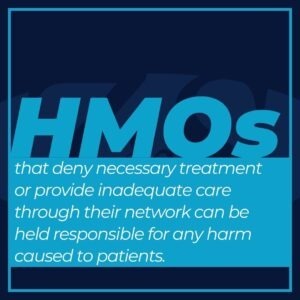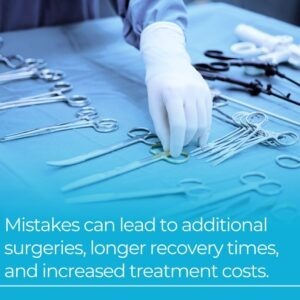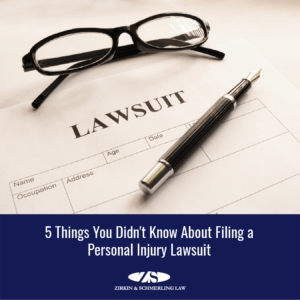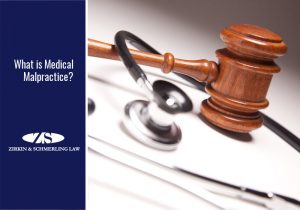Why You Need Medical Malpractice Attorneys in Maryland

Medical errors made by healthcare providers can have a long-reaching impact on a patient’s life, often causing substantial pain and suffering, permanent disabilities, forced career change or retirement, stress and tension within relationships, and even death.
Medical malpractice refers to the lack of care, or inappropriate care that harms the patient.
When an injury, illness, or death occurs due to medical malpractice, the victim may be able to file a lawsuit to regain compensation. You need an experienced and compassionate medical malpractice attorney to represent you in your fight against the doctors, nurses, or hospital’s insurance company.
Call Zirkin & Schmerling’s medical malpractice lawyers at 410-753-4611 so we can fight for the justice you deserve from the insurance company. Our experienced attorneys are committed to delivering personalized legal strategies tailored to your unique needs and circumstances.
What Does Medical Malpractice Mean in Maryland?
Maryland law defines medical malpractice as “any act or omission by a physician during treatment of a patient that deviates from accepted norms of practice in the medical community and causes an injury to the patient.”
Claiming medical malpractice occurred requires proving a healthcare provider “breached the standard of care,” which is what a reasonably competent healthcare provider with similar training and experience would do under the same or similar circumstances.
Examples of a breach of “standard of care” include:

Failure to diagnose: This breach occurs when a healthcare provider overlooks symptoms and does not provide an individual with a diagnosis that a doctor could reasonably make in their position.
Misdiagnosis of an illness or injury: This is the result of a medical professional diagnosing a patient incorrectly and treating them for the wrong disease or condition. It results in additional medical costs and the prolongment or advancement of the injury or illness.
Failure to properly administer treatment occurs when a healthcare professional fails to treat a patient in a timely or acceptable manner.
Failure to receive informed patient consent before treatment: In the United States, healthcare officials must obtain informed consent from the patient or the designated spokesperson about the risks and benefits of any treatment or procedure before undertaking it.
Improperly prescribing medications: This breach occurs when a professional prescribes an incorrect medicine for the patient or condition, either through misdiagnosis or failure to take the patient’s medical history, current medications, and allergies into account.
Surgical errors: Any medical errors made by professional medical personnel during a surgical procedure that could have been reasonably avoided, such as misuse of tools or improper performance, fall under this breach.
Premature discharge: This occurs when medical professionals discharge a patient from their care when one could reasonably argue that the patient requires further treatment.
Failure to properly take patient history into account: This breach occurs when a medical professional fails to know the patient’s mental, physical, and medical history before treatment, and an injury or illness results from the error.
Our experienced attorneys are committed to delivering personalized legal strategies tailored to your unique needs and circumstances. Time is critical in medical malpractice cases.
Contact Zirkin & Schmerling at 410-753-4611 to immediately start your medical malpractice claim.
How Do You Know If You Have a Medical Malpractice Case in Maryland?

If medical malpractice occurred to your loved one, your attorney must prove several elements of medical negligence. This process involves showing that the defendant is responsible for your damages.
First, your Maryland medical malpractice lawyers in Baltimore must prove that there was a formal doctor-patient relationship between you and the defendant.
Next, your Maryland medical malpractice attorney needs to establish the standard of care required in your situation. This may involve consulting with a qualified medical expert who can confirm whether the treatment you received was appropriate.
Then, your lawyer must demonstrate that the doctor failed to meet this standard of care. It is also necessary to prove that this failure directly caused your damages.
Many medical malpractice cases involve victims needing additional treatment, which increases medical expenses and extends recovery time. The bottom line is that a reasonable or prudent person would have taken steps to prevent the foreseeable harm, and your provider did not.
Your Baltimore medical malpractice lawyers will help you evaluate the extent of the damages to include in your claim. Zirkin & Schmerling’s Baltimore medical malpractice attorneys have extensive experience handling complex medical malpractice claims. Our trusted medical malpractice lawyers in Maryland will help you determine the full scope of damages and consult with medical experts to support your case.
Contact us at 410-753-4611 to discuss how we can help the doctors, nurses, or other medical professionals accountable. We pride ourselves on our compassionate approach of legal representation, ensuring you feel supported throughout your legal journey.
Compensation for Medical Malpractice Cases
Injuries resulting from medical malpractice can lead to various forms of recoverable damages or compensation.
Claim damages are typically divided into three categories: general, unique, and punitive.
General Damages
You can claim general damages from healthcare professionals for intangible losses, such as pain and suffering, emotional distress, loss of consortium, and loss of enjoyment of life.
General damages for medical malpractice may include:

- Loss of consortium: The inability to perform or receive the benefits of familial or spousal relationships due to injury or illness related to medical mistakes. This covers the loss of companionship, affection, and sexual relations, which can deeply impact the emotional well-being of the patient and their loved ones.
- Inability to perform household duties: Injuries or illnesses resulting from malpractice can hinder the ability to perform essential household tasks such as housework, cooking, or childcare, placing additional burdens on the family.
- Past pain and suffering: Compensation for physical and emotional pain endured from the moment of the malpractice incident up to the time of settlement or trial. This includes the trauma, stress, and inconvenience caused by the injury or illness.
- Future pain and suffering: Anticipated ongoing and future physical and emotional distress that the claimant will experience due to the malpractice. This can include chronic pain, disability, and emotional disorders like anxiety or depression.
Because of the diverse nature of these damages, awards can vary significantly from case to case. The subjective nature of pain and suffering makes assigning a precise monetary value challenging, leading to variability in compensation amounts.
Contact Zirkin & Schmerling’s Maryland medical malpractice law firm at 410-753-4611 to protect your rights in a medical malpractice case.
Special Damages
General damages can be challenging to quantify and are highly subjective; special damages (also called economic damages) are more accessible to determine and prove.
Special damages include:
- Past medical expenses: Costs incurred due to improper care or to remedy the consequences of inappropriate care. This can cover medical bills, surgery costs, medication, therapy, and other treatments received before the case is resolved.
- Past lost wages: Compensation for income lost due to the inability to work or perform tasks associated with one’s career due to medical injury or illness incurred from medical malpractice. This includes salary, lost bonuses, promotions, and other work-related benefits.
- Future medical expenses: Anticipated costs for ongoing medical treatment necessary to address issues stemming from malpractice. This can include long-term care, rehabilitation, future surgeries, and ongoing medication or therapy.
- Future lost wages: Compensation for the projected loss of income due to the continued inability to work or perform career-related tasks due to the malpractice. This can include diminished earning capacity if the patient can work but in a reduced capacity.
- Past accommodation costs: Expenses incurred to medically and physically accommodate the patient due to personal injury or illness. This can include home modifications, special equipment, and additional services required to support the patient’s daily living.
- Future accommodation costs: Because of the injury, anticipated expenses for future medical and physical accommodations are needed. These can include long-term modifications to the home, ongoing care services, and adaptive devices necessary for the patient’s comfort and functionality.
Medical negligence cases are complex to prove. Call us at 410-753-4611 and let our Maryland medical malpractice attorneys help. With decades of local experience and a proven track record, we are dedicated to securing the best possible results for you and your family.
Punitive Damages

Punitive damages may also be awarded in cases of reckless healthcare provider behavior. Unlike compensatory damages, punitive damages send a strong message against gross medical negligence or intentional harm.
In Maryland, punitive damages require clear and convincing evidence that the healthcare provider acted with malice or deliberate intent to harm.
To pursue punitive damages, the plaintiff must demonstrate that the healthcare provider’s actions were more than just negligent but showed a willful disregard for patient safety. Medical malpractice attorneys must prove the provider was aware of the risks and chose to ignore them, resulting in severe harm to the patient.
Due to the high standard of proof required, securing punitive damages can be challenging. A dedicated Maryland medical malpractice attorney can build a strong case demonstrating the need for such an award.
If you believe a medical professional acted with intent to harm, contact us immediately at 410-753-4611 to discuss your case.
Can I Sue for Wrongful Death in a Medical Malpractice Case?
Wrongful death medical malpractice occurs when the negligent actions or omissions of a healthcare provider directly cause a patient’s death.
Compensation in these cases can cover medical expenses incurred before death, funeral costs, loss of income, and the emotional suffering of the surviving family members. A trustworthy wrongful death attorney can help navigate the complexities of these personal injury claims and see that the family receives the justice and compensation they deserve.
If your loved one died due to medical malpractice, contact Zirkin & Schmerling at 410-753-4611 for a free case evaluation.
Common Types of Medical Malpractice
Understanding the specifics of the malpractice incident is crucial in building a solid case. By identifying the type of medical error and demonstrating its impact, a medical malpractice lawyer can effectively seek compensation for their client.
Zirkin & Schmerling provides representation for various medical malpractice claims, including:
Surgical Errors
Surgeons must perform with great care, even in minor or routine surgeries.
Mistakes can lead to additional surgeries, longer recovery times, and increased treatment costs.
Examples include retained instruments or anesthesia complications.
A qualified surgical error lawyer can determine responsibility and pursue legal action.
Anesthesia Errors
Anesthesia must be administered by a skilled provider. Errors, such as incorrect dosage, can cause significant harm, including waking up during surgery or lasting damage. If anesthesia errors occur, patients may be entitled to make a claim.
Birth Injuries
Birth injuries can cause permanent harm to the infant and sometimes affect the mother’s health. A medical professional’s negligence during childbirth can lead to conditions like cerebral palsy or other severe birth injuries. Parents can seek compensation for immediate and future medical costs with the help of an experienced medical malpractice lawyer.
Emergency Room Errors
Emergency rooms are busy, but medical providers must maintain appropriate care standards. Errors in this environment can have severe consequences. If you believe an emergency room error caused your personal injury, you can file a medical malpractice claim against the responsible personnel.
Hospital Infections
Hospitals must adhere to strict sanitation protocols. Failure to properly sterilize areas can lead to infections. If you or a loved one developed an infection due to poor sanitation, you may hold the hospital accountable through a malpractice claim.
Post-Surgical Infections
Hospital areas must be regularly cleaned to high standards to prevent post-surgical infections. You might be entitled to compensation if you develop a disease due to medical negligence.
Misdiagnosis and Delayed Diagnosis

Doctors must follow a precise diagnostic process. When a provider failed or delayed diagnosis, the patient’s condition became more severe. Proving that a healthcare provider’s negligence caused harm is vital for a successful claim.
Prescription Medication Errors
Incorrect prescriptions or dosages can lead to severe injury or death. Errors can occur when a doctor prescribes the wrong medication or dosage, or a pharmacist fills a prescription incorrectly. Demonstrating that medical negligence caused harm is essential for holding the responsible party accountable.
Failure to Inform Patients of Risks
Before consenting to procedures, patients must be informed of risks. If you were not adequately informed of the dangers and suffered, you might have grounds for a claim.
Medical Record Errors
Accurate health case records are crucial to preventing errors. Mistakes in records can lead to incorrect medical treatment or procedures, and the consequences can be severe if records are not kept up to date.
If medical malpractice occurs (such as surgical errors, misdiagnosis, and medication mistakes), call Zirkin & Schmerling to protect your rights in a medical malpractice lawsuit.
Contact our Maryland medical malpractice attorneys at 410-753-4611 for more information on the types of compensation you may be eligible for.
Proving Medical Malpractice in Maryland
Proving malpractice involves more than showing a medical mistake was made by a healthcare professional.
Seek legal advice immediately to determine if an attorney can establish the following five elements in your case:
Doctor-patient relationship: This is typically straightforward to prove. It means you received or agreed to receive treatment from the doctor.
Duty of care: A duty of care exists once a medical professional agrees to provide treatment. This duty requires the professional to offer care that meets accepted medical standards for their specialty and expertise. Essentially, the care provided must be comparable to what another professional with similar training would provide in a similar situation. A qualified medical expert will help define the duty of care relevant to your case.
Breach of duty of care: The medical professional needed to meet the established duty of care. The breach can occur through action or inaction that does not meet the accepted standard.
Causation: Linking the breach of duty to your injuries can be challenging. It requires proving that the medical professional’s failure directly caused your injury rather than being due to your actions or a preexisting condition.
Damages: Our Maryland medical malpractice lawyers will assess all the damages you suffered, including doctor’s records, receipts, employment records, and your personal account of the injury’s impact.
With years of combined experience, Zirkin & Schmerling Maryland understands how to effectively prove medical malpractice against a medical professional.
Contact us at 410-753-4611 for experienced guidance with personal injury claims.
Who Can You Sue in a Medical Malpractice Suit in Maryland?
In Maryland, a victim of medical malpractice can pursue legal action against any healthcare professional or entity that caused personal injury or death due to inadequate care.
Some of the medical providers and organizations that may be liable for your injuries include:

Doctors: Doctors can be sued for malpractice if they fail to diagnose, misdiagnose, or provide incorrect treatment that results in harm to the patient.
Nurses: Nurses who administer incorrect medications, fail to monitor patients properly, or neglect their duties can be held accountable for malpractice.
Technicians: Medical technicians who perform diagnostic tests or medical procedures incorrectly, leading to personal injury, can be sued for malpractice.
Anesthesiologists: Anesthesiologists can be liable for malpractice if they administer the wrong dosage of anesthesia or fail to monitor the patient’s vital signs during surgery.
Aids or assistants: Medical assistants or aides who provide inadequate care or fail to follow medical instructions can be held responsible for any resulting harm.
Hospitals: Hospitals can be sued for systemic issues, such as inadequate staffing, poor hygiene practices, or failure to maintain equipment, which lead to patient injuries.
Nursing homes: Nursing homes that provide substandard care, leading to injury or death, can be held liable in a malpractice suit. This includes cases of neglect or abuse.
Healthcare companies: Healthcare companies that manage medical facilities and fail to ensure proper standards of care can be sued for malpractice.
HMOs (Health Maintenance Organizations): HMOs that deny necessary treatment or provide inadequate care through their network can be held responsible for any harm caused to patients.
More: Other entities, such as pharmacies, outpatient clinics, and specialty care centers, can also be held accountable if their negligence results in patient injury or death.
If you or a loved one are a victim of medical malpractice, it is essential to consult with Zirkin & Schmerling to discuss your legal options. Contact us at 410-753-4611 for more information.
The Statute of Limitations on Maryland Medical Malpractice Lawsuits
Maryland law specifies a limited timeframe for filing a medical malpractice lawsuit.
The statute of limitations is either:
- Five years from the date the malpractice occurred, or
- Three years from the date the injury or error was discovered.
The shorter period applies in any given case. For instance, if a surgeon left a piece of medical equipment in your abdomen and you didn’t notice any issues for four years, your case would be valid if you brought it to the attention of a doctor and a Maryland medical malpractice lawyer within three years of discovering the problem.
However, if you wait longer than three years after discovering the issue to consult a doctor, your lawsuit will no longer be valid.
Contact the Maryland law firm of Zirkin & Schmerling at 410-753-4611 for a free medical malpractice claim consultation. We can answer your medical malpractice FAQs.
What Evidence Can Maryland Medical Malpractice Lawyers Use to Prove Medical Malpractice?
Proving a medical malpractice claim requires comprehensive documentation to establish that your medical negligence case occurred and resulted in harm.
The following types of documentation are crucial in building a solid case:

Medical records: Complete medical records from all healthcare providers involved are essential. These records include details of diagnoses, treatments, medications, surgeries, and follow-up care. They provide a timeline of events and help identify deviations from standard medical practices.
Diagnostic test results: Copies of all diagnostic test results, such as X-rays, MRIs, blood tests, and other lab reports, are essential. These documents show whether appropriate tests were conducted and the results were interpreted correctly.
Consultation reports: Reports and notes from consultations with specialists and other medical professionals can provide insight into the medical opinions and advice throughout the treatment process.
Prescription records: Detailed records of all prescribed medications, including dosages and administration instructions, are necessary to verify whether medication errors occurred.
Treatment plans: Documentation of treatment plans and any changes made during care can help establish whether the standard of care was followed.
Informed consent forms: Signed consent forms that detail the risks and benefits of procedures or treatments are essential. These forms show whether patients were adequately informed before consenting to medical interventions.
Witness statements: Statements from witnesses, including family members, friends, or other patients who observed the care provided, can support medical malpractice claims, negligence, or improper behavior.
Communication records: Copies of all communications with healthcare providers, such as emails, letters, and phone call logs, can provide evidence of what information was exchanged and any concerns raised by the patient or their family.
Financial records: Bills and receipts for medical treatments, medications, and other healthcare-related expenses can demonstrate the economic impact of malpractice.
Personal diary or journal: A personal diary or journal documenting the patient’s experiences, symptoms, and interactions with healthcare providers can offer a detailed account of the impact of malpractice on the patient’s daily life.
Collecting and organizing this documentation is critical in proving a medical malpractice claim. An experienced medical malpractice attorney can help gather and interpret these records, presenting all necessary evidence effectively.
For assistance with your medical malpractice case, contact Zirkin & Schmerling at 410-753-4611.
Mistakes to Avoid in Medical Malpractice Claims
When dealing with a potential medical malpractice case, avoiding these common mistakes is crucial:

Delaying a second opinion: If you suspect a mistake in your treatment, don’t wait too long to seek a second opinion. An immediate consultation with another doctor can provide clarity on the issue.
Failing to question your doctor: Don’t hesitate to confront your doctor if you believe something went wrong. Asking questions and addressing concerns promptly is essential.
Not consulting a MD medical malpractice attorney: Don’t overlook the importance of speaking to an attorney if you suspect malpractice. Legal guidance is vital for understanding your options and the strength of your case.
Neglecting documentation: Don’t forget to document everything related to your medical care. Missing details about appointments, treatments, and communications can weaken your case.
Ignoring medical advice: Don’t ignore or deviate from your prescribed treatment plans. Non-compliance can be used against you in a malpractice claim.
Overlooking evidence collection: Don’t neglect to gather all relevant medical records, test results, and prescriptions. Comprehensive evidence is crucial for building a solid case.
Discussing your case on social media: Don’t post about your medical condition or potential case on social media. Such posts can be used against you by opposing parties.
Choosing inexperienced legal counsel: Don’t choose a medical malpractice attorney without experience in medical malpractice. Specialized legal expertise is necessary to navigate these complex cases effectively.
Misunderstanding the statute of limitations: Don’t ignore the time limits for filing a claim. In Maryland, you generally have five years from the injury date or three years from discovering the injury, whichever is shorter.
Avoiding these mistakes can improve your chances of a successful medical malpractice claim. For assistance, contact the law offices of Zirkin & Schmerling at 410-753-4611.
Need Answers About Medical Malpractice? We’re Here to Help
Your dignity and future and the quality of life of your dependents are contingent upon the outcome of this case. There’s only one name you should remember when considering experience, results, and reputation for Maryland’s medical malpractice cases. That name is Zirkin & Schmerling.
Seek legal representation right away to protect your rights. Call Zirkin & Schmerling today at 410-753-4611 for a free consultation for medical malpractice claims.
Contact Zirkin & Schmerling’s Medical Malpractice Lawyers
If your serious injury occurred as a result of medical malpractice, call the experienced medical malpractice lawyers at Zirkin & Schmerling to discuss your case. We understand that medical malpractice can be a confusing, frustrating, and traumatic experience.
You need someone on your side during your medical malpractice claim or wrongful death claim who will help restore your peace of mind, dignity, and rights.
Call 410-753-4611 for a free medical malpractice case consultation.





